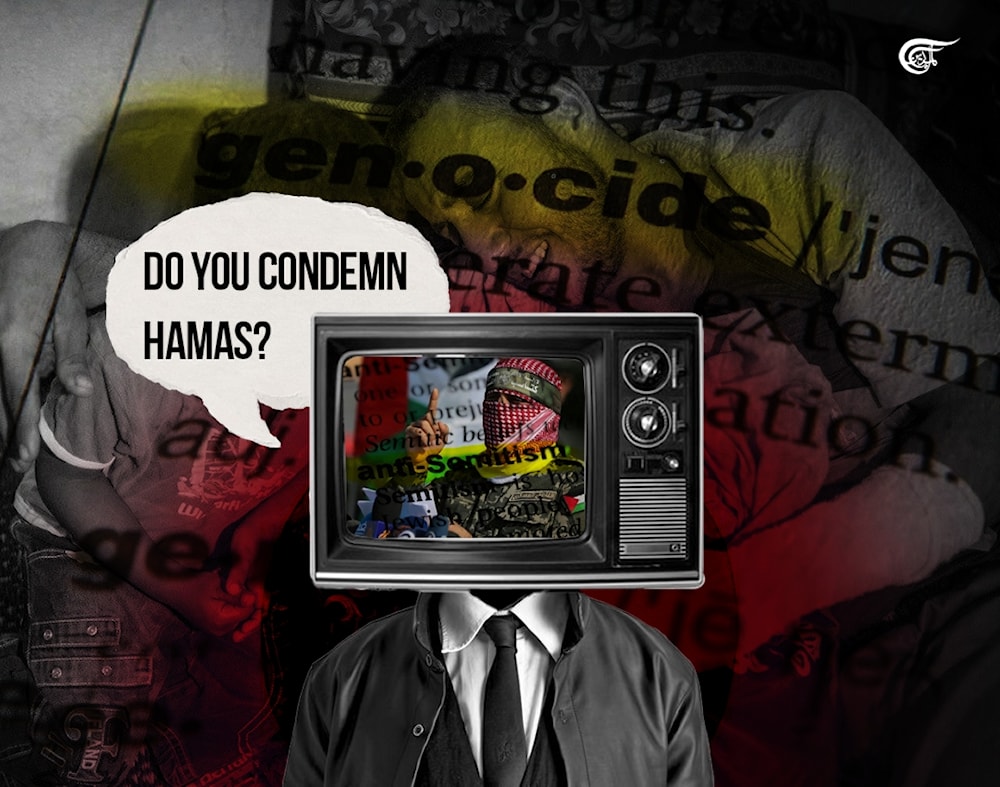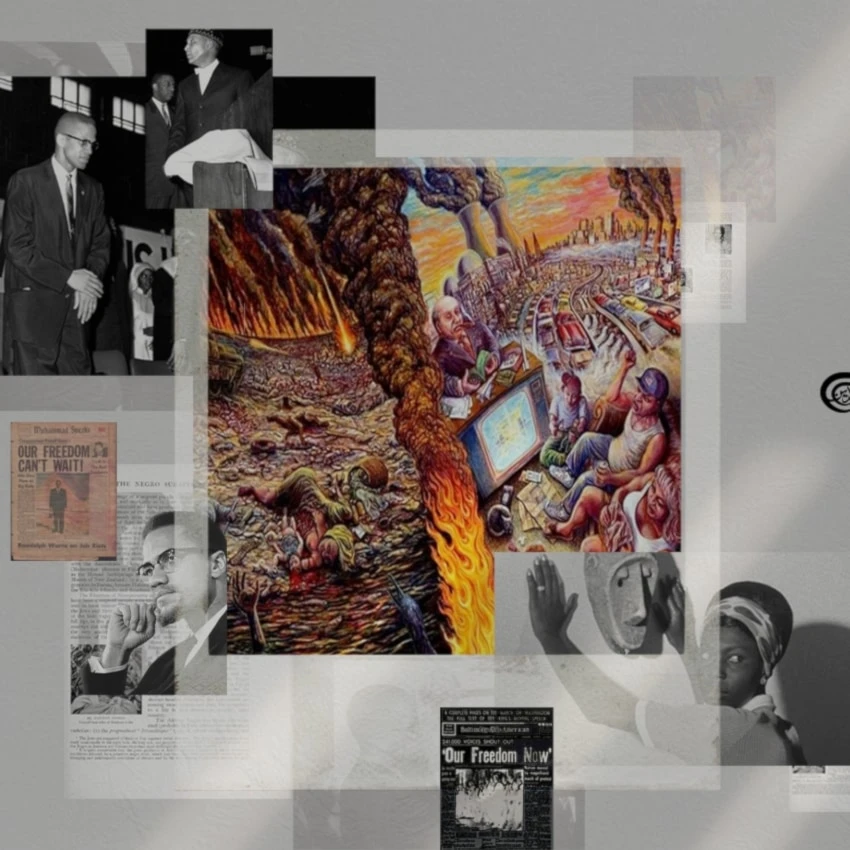Pathologising Palestinians to revive eugenic genocide
‘Britain’s establishment has always wanted to Genocide the Palestinians’
-

The justifications for the genocide in Gaza may be the first stirrings of genocide resuming its historical role in the West as a form of violence that consolidates Western domination of the world. (Al Mayadeen English; Illustrated by Arwa Makki)
The current Zionist barbaric onslaught against Palestinians in Gaza is a continuation of Britain’s Zionist-colonial project and the resistance to it, ever since the project was officially launched when the British government issued the Balfour Declaration in 1917 to establish a ‘Jewish home’ in Palestine.
In the three decades that followed the launch, the European colonial-settler population increased by hundreds of thousands under British military auspices, and against the wishes of the indigenous Palestinian population. In effect, Britain midwifed the Zionist colonial-settler project in occupied Palestine, so it is no surprise the British establishment and its mainstream media have unanimously and enthusiastically defended the Zionist colonial project’s never-ending wars against the indigenous population.
After the Palestinian resistance’s advance, led by Hamas, on October 7th, the British and Western media unsurprisingly whipped themselves into a frenzy and furnished their pages and websites with lurid and unsubstantiated stories about the Resistance’s alleged indiscriminate killing, which included unfounded tales about decapitated babies and raped women. The military advance temporarily captured some territory in southern occupied Palestine, which caught the Zionists off-guard.
The media naturally framed and classified this advance as a manifestation of “hate” and “anti-Semitism” by crazed individuals, and nothing to do with the fact that Palestinians have faced more than a hundred years of occupation, colonialism, dispossession, collective punishment, and ethnic cleansing.
In other words, the British and Western media framed the Resistance’s advance in terms which elided the colonial roots of the Resistance’s raison d’être, that is freedom from occupation and colonialism. Instead, the Palestinian Resistance was in effect pathologized; depicted as beholden to a mental sickness rather than as a commitment to a noble political cause rooted in centuries-long resistance to Western colonialism and imperialism.
As such, the London Times on October 9th referred to the HAMAS-led military operation as a “display of fanaticism by thwarted and angry individuals” and as a “suicide mission”. As we all know only the mentally disturbed are suicidal. On the following day, the former editor of the Daily and Sunday Telegraph, Charles Moore, in an article titled, “HAMAS’s hatred of Jews mustn’t be Downplayed” claimed the HAMAS-led Resistance are possessed by a “murderous hatred [that] will have dangerous consequences for Jews everywhere.”
On October 11th the Telegraph editorialised, in a piece titled, “Hateful Ideology” that the Resistance’s motives behind its military advance “are hard to fathom beyond a desire to kill Jews” and concluded that those of us support the Resistance are, “in reality subscribing to a profoundly hateful anti-Semitic ideology.” Obviously, this is a blatant lie and only serves as de-historicising the Palestinian struggle against occupation and ethnic cleansing.
The author and opinion writer, Matthew Syed, in The Sunday Times, spoke of the “virus of fundamentalism” and the “germ of fanaticism” in an article titled, “Until we find a vaccine for religious fundamentalism, there is no peace”. The next day, The Times published on October 16th an editorial, “The Longest Hatred” and declared in the sub-title that the Resistance’s advance was a product of “antisemitic fanaticism” and linked the events to European pogroms from the 19th century.
In contrast to these deceptive, decontextualized diatribes, the actual colonial nature of the Palestinian situation was very succinctly expressed by no lesser a figure than one of the first British champions of the Zionist-colonial endeavour in Palestine, Winston Churchill. He categorically stated during the British Parliament’s Peel Commission on Palestine amidst the Arab uprising against Britain’s settler-colonial project that:
“I do not admit that the dog in the manger has the final right to the manger, even though he may have lain there for a very long time…I do not admit, for instance, that a great wrong has been done to the Red Indians of America, or the black people of Australia…I do not think the Red Indians had any right to say, ‘The American Continent belongs to us and we are not going to have any of these European settlers coming in here’. They had not the right, nor had they the power.”
These words were uttered in the late 1930s before the outbreak of world war and the holocaust. They were made to justify the military crushing of the indigenous revolt between 1936-9. They clearly demonstrate that in Churchill’s mind, some nations were ‘fit’ to live and others must, to put it politely, disappear one way or another. After the war in 1945, the Jewish holocaust was weaponised as the rationale for the establishment of the Zionist colonial entity in Palestine.
The period between Churchill’s genocidal utterances and the mid-1940s saw the Zionist colonial project morph and marketed into a humanitarian endeavour to address the anti-Semitism which had resulted in the Jewish holocaust. But as the author James Baldwin wrote in the late 1970s:
“…the state of Israel was not created for the salvation of the Jews; it was created for the salvation of the Western interests…The Palestinians have been paying for the British colonial policy of “divide and rule” and for Europe’s guilty Christian conscience for more than thirty years.”
So taking Baldwin’s lead, the denial of the colonial nature of modern “Israel” in favour of Europe’s supposedly ‘guilty Christian conscience’ supposedly lays at the root of pro-Zionist British and Western commentary on the never-ending war on Palestine. This allows the media and its commentariat to bypass colonial history and position themselves as moral guardians of Jewish people who have faced anti-Semitism for many centuries. Those who oppose this contextualisation or point to the colonial history behind the Zionist war on Palestine are considered beyond the pale and therefore pathologized.
It is within this ‘pathology paradigm’ that British establishment media reporting is justifying the Zionist-colonial entity unleashing its indiscriminate air campaign, which has led to upwards of ten thousand Palestinians killed, water and electricity cut off, hospitals, schools and universities bombed, doctors killed, bakeries targeted, journalists and UN staff killed. It would be impossible not to classify this brutality as genocide. This is all partly justified, directly or indirectly, on the basis that Palestinians are mentally debilitated.
Of course, it is not only the historical colonial context that draws the ire of the pro-genocidist media, that is the media which rejects a ceasefire, but the mere mention or insinuation that Gaza has been under a blockade and siege for over 15 years or that the inhabitants of Gaza are the grandchildren of the ethnic cleansed generation from the mid-1940s is received in horror. When the head of the United Nations, Antonio Guterres, said that the October 7th attacks didn’t happen in a vacuum, the same papers sunk into moral indignation calling for his resignation.
Furthermore, the denial or the lack of reporting on the colonial context of the current genocide on the indigenous population is a logical outcome of an educational and intellectual culture that up until very recently had overlooked the continued reverberations and ramifications of British imperialist policies.
Even with the recent sudden (post-Brexit vote) interest in the British Empire, there remains little interest in how British imperialism laid the foundations for the ethnic cleansing of Palestine. The reason for this is that many of the critical books written about the British Empire aim to address domestic ‘imperial nostalgia’, which many argued was partly responsible for the Brexit vote, that is, the vote to leave the European Union.
For example, Sathnam Sanghera's best-seller about the British Empire, and Professor Priyamvada Gopal’s book on “Insurgent Empire”, have little or no time for Palestine per se, let alone how Britain created the foundations for the ethnic cleansing of Palestine. Gopal’s book is the most disingenuous and perverse, because it claims to be a history of “anti-colonialist resistance” in the British Empire that is inspired by the Palestinian academic Edward Said. Yet the geopolitical framework that most concerned Said is for some reason absent in the book, as though the Palestinians never resisted British imperialism and its Zionist colonial proteges. This culture of historically eliding Britain’s foundational role in the plight of Palestinians allows, consciously or unconsciously, for the pathologizing of the Palestinian cause to flourish.
We need to ask, if even those who are critical of Empire are not prepared to discuss how Britian laid the foundations for the ethnic cleansing of Palestine, then who is?
It therefore comes as no surprise that most establishment articles in support of the Zionist entity’s genocide against Palestinians in Gaza are written from a pathology paradigm, instead of a colonial context. These identikit articles are all an extrapolation of one premise, that is, Palestinians and their supporters are “antisemites”, full of “hatred” or “malign” or some other pejorative, therefore the Zionist entity is entitled to military destroy their civilian infrastructure and kill women and children.
However, as one can see from the above Winston Churchill quote, genocide against the indigenous Palestinians has been the mainstay of British establishment politics since the 1930s. This genocidal impulse has been extant long before the Palestinian Resistance’s advance on October 7th, well before “antisemitism” and “Nazis” became the ultimate insults in Western politics and indeed well before the official creation of “Israel”. The current pathologizing of Palestinians has provided a modern pretext for their genocide.
To be fair to the genocidist Churchill and the British establishment media, the urge to genocide indigenous populations wasn’t something unique to Britain. Genocide was an attendant of Western military, economic and political domination for the last 500 years. As, Sven Lindqvist wrote in his landmark book on genocide, “Exterminate all the Brutes”, “during the nineteenth-century European expansion, another attitude appeared. Genocide began to be regarded as the inevitable byproduct of progress.” Genocide only fell out of favour with Europeans when one of their own, Adolf Hitler, applied the same methods of colonial expansion to Europe. He intended his German Empire, the Third Reich, to emulate the British Empire. Hitler had pronounced that what “India was for England…the territories of Russia will be for us.”
In conclusion, the justifications for the genocide of Palestinians in Gaza may be the first stirrings of genocide resuming its historical role in the West as a form of violence that consolidates or advances continued Western domination of the world. As Dr. Amal Saad, an expert on the resistance to Zionist aggression observes, “Western media is now a platform where Israeli officials can brazenly declare their genocidal intent. Not only does this serve to normalise ethnic cleansing of Palestinians, but also to rehabilitate genocide as a kind of strategic objective and hence a 'win' for a flailing Israel”. Only time will tell whether Britain and the West will adopt genocide afresh in the face of the West’s flailing position as rising powers challenge Western global hegemony.

 Nu’man Abd al-Wahid
Nu’man Abd al-Wahid
 10 Min Read
10 Min Read












